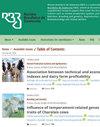Differences in the typology of dairy systems producing artisanal cheese and those producing only raw milk in Paraná State, Brazil
IF 1.2
4区 农林科学
Q3 Agricultural and Biological Sciences
Revista Brasileira De Zootecnia-Brazilian Journal of Animal Science
Pub Date : 2023-05-29
DOI:10.37496/rbz5220220154
引用次数: 0
Abstract
- We sought to develop a typology describing structural, production, and socioeconomic characteristics of dairy systems that produce artisanal cheese and compare it with that of systems that produce only raw milk. Data on 204 raw milk producers and 58 artisanal cheese producers in Paraná State, Brazil, were collected through on-site surveys and subjected to descriptive analysis, factor analysis, and means tests. Descriptive analyses were applied to characterize the sample and artisanal cheese production processes. Factor analysis identified the following three typological components: system production capacity, herd breed and milking characteristics, and farmer social characteristics. Farmers were divided into two groups, as follows: non-cheese producers (NCP) and artisanal cheese producers (ACP). Groups of farmers were compared in terms of typological components. It was found that ACP have smaller structure and production scale and focus less on herd breed and practices for improving milk quality than NCP. These results suggest that artisanal cheese production is a strategy to add value to milk that does not meet institutional or market requirements for transactions with the dairy industry, providing a foothold for producers to remain in the dairy business. Groups of farmers (ACP and NCP) do not differ in social indicators of typology.巴西帕拉纳州生产手工奶酪和仅生产原料牛奶的乳制品系统类型的差异
-我们试图开发一种类型学,描述生产手工奶酪的乳制品系统的结构、生产和社会经济特征,并将其与仅生产原料牛奶的系统进行比较。通过现场调查收集了巴西paran州204家原料奶生产商和58家手工奶酪生产商的数据,并进行了描述性分析、因素分析和经济状况调查。描述性分析用于描述样品和手工奶酪生产过程。因子分析确定了系统生产能力、畜群品种和挤奶特征、农户社会特征三个类型组成部分。农民被分为两组,非奶酪生产者(NCP)和手工奶酪生产者(ACP)。根据类型成分对农民群体进行比较。结果表明,ACP与NCP相比,结构和生产规模更小,对畜群品种和提高乳品质的重视程度更低。这些结果表明,手工奶酪生产是一种为牛奶增加价值的策略,它不符合与乳制品行业交易的制度或市场要求,为生产商留在乳制品行业提供了立足点。农民群体(ACP和NCP)在类型学的社会指标上没有差异。
本文章由计算机程序翻译,如有差异,请以英文原文为准。
求助全文
约1分钟内获得全文
求助全文
来源期刊
CiteScore
1.90
自引率
0.00%
发文量
25
审稿时长
8 weeks
期刊介绍:
The Revista Brasileira de Zootecnia (RBZ; Brazilian Journal of Animal Science) encompasses all fields of Animal Science Research. The RBZ publishes original scientific articles in the areas of Aquaculture, Biometeorology and Animal Welfare, Forage Crops and Grasslands, Animal and Forage Plants Breeding and Genetics, Animal Reproduction, Ruminant and Non-Ruminant Nutrition, and Animal Production Systems and Agribusiness.

 求助内容:
求助内容: 应助结果提醒方式:
应助结果提醒方式:


